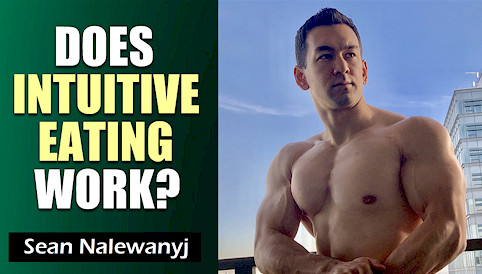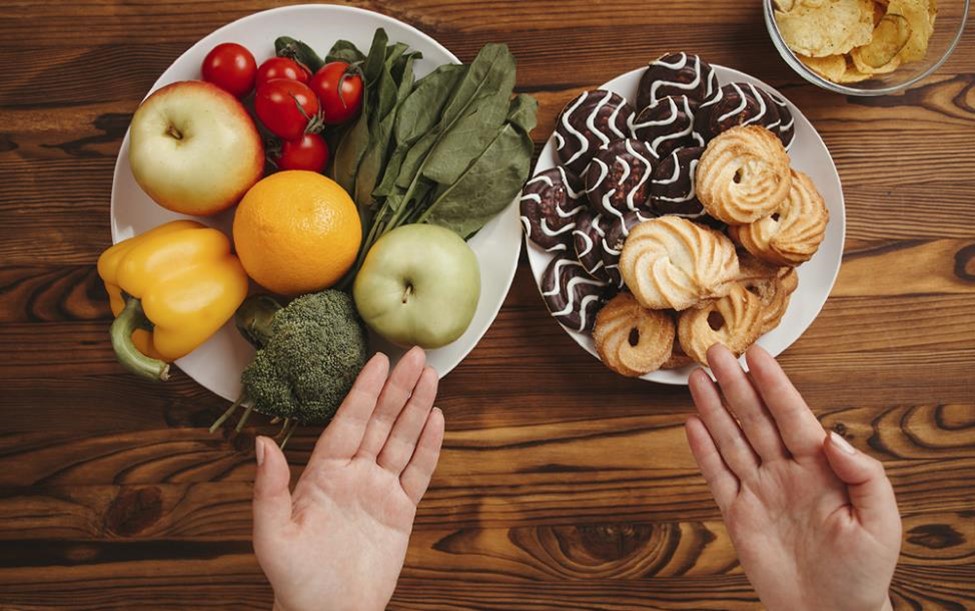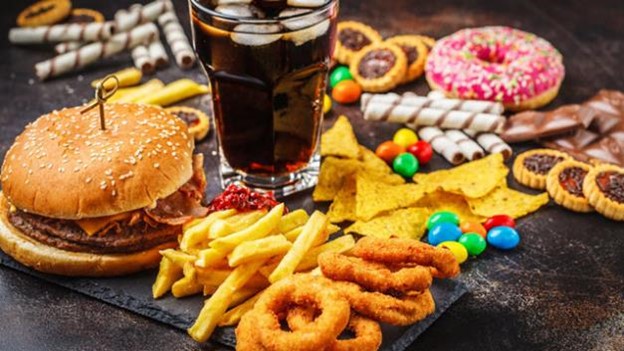DOES INTUITIVE EATING REALLY WORK FOR FAT LOSS? (THE TRUTH)

Intuitive Eating: Dos and Don’ts
On the subject of losing fat, the process may seem complicated. In reality, it isn’t, and intuitive eating doesn’t have to be either.
In this article, we’re going to be discussing the subject of intuitive eating, and how it relates to fat loss. My goal is to give you the skills so you can lose fat effectively without any form of caloric tracking.
So, What is Intuitive Eating?

By definition, intuitive eating means estimating your intake on the go and eating according to your body’s hunger signals, and based on how you feel.
If this is the first you’ve heard of this approach, you may be asking yourself:
Is it possible to lean down and drop body fat consistently without tracking daily calories?
The answer is a resounding yes, of course it is possible. There are plenty of people who do it. However, as a general rule, I’d say that this mostly applies in specific situations.
Intuitive Eating Situation #1:
The first is if you’re in the more intermediate to advanced stages with your fitness plan. This means you already have previous experience with dietary tracking.
So, let’s say you have a good general idea on how to calculate your maintenance calories. You have a rough idea of the nutritional content of the foods you’re eating, and you know how to listen to your body and adjust your diet throughout the day in order to land around your proper calorie and macro ranges.
If you’ve already put in the work previously to gain that skill, you’re probably now able to put things more on auto pilot.
This is a situation where intuitive eating will often work just fine. As a longer term goal, most people ultimately will want to progress to that stage as I’m sure nobody wants or needs to be tracking calories for the rest of their life.
This is of course aside from temporary phases where maybe you’re really trying to dial your results in more closely. But, a more intuitive eating style should be the ultimate end goal for most people.
Intuitive Eating Situation #2:
The second situation would be if your current diet is just really poor overall at the moment.

Let’s say you’re taking in a lot of obvious foods that you should be limiting. These are things like fast food, big restaurant meals, sodas, sweet dessert type foods, etc. Any items that pack a lot of calories into a small volume of food will fit into this category.
If you go ahead and clean things up by replacing a good chunk of those foods with minimally processed whole foods, chances are you’re going to start losing body fat even without specifically tracking anything.
Now, there is a common misconception that there are “fat burning foods” that you should eat instead. This is a completely false statement, however, since any food item that contains calories will always result in a net increase in your total calorie intake for the day.
Instead, focus on starting to eat more protein and veggies to control your appetite, in addition to adding exercise to your lifestyle regimen. Overall, if you expend more calories, then you will lose fat in the initial stages.
So, in these two scenarios, intuitive eating is a viable option that can work well.
However, intuitive eating is not recommended if you’re still in the beginner stages with your fat loss program.
Say you don’t have a lot of knowledge in terms of your body’s caloric needs and the calorie content of the foods you’re eating. In that case, tracking your diet for at least a temporary period is probably going to be your best bet. It could very well make the difference between success and failure with your fat loss goals.
Even if your diet isn’t horrible right now–maybe not ideal but not too bad–you should learn the basics of calorie counting and tracking your food intake. If you’re truly serious about getting a handle on your health and fitness, along with losing body fat, then learning to count calories will set yourself up in the best way possible over the long term.
It’s become really common nowadays for people to talk about the benefits of eating intuitively and “listening to your body.” A lot of people out there want to “demonize” caloric tracking as if it’s this evil, unhealthy thing.
The reality is, your body (in terms of the natural cravings and hunger signals), is not some sort of perfect system. It’s wired up for a much different environment than the one we live in today.
The modern world as it is now (with the endless abundance of food we have everywhere) is not normal to our physiology. Coupled with the fact that this food is hyper palatable, calorically dense, inexpensive, and comes in large portion sizes that you barely even need to expend any calories to obtain, we’re not nearly in the same spot we once were as a species.

This world is the blink of an eye in evolutionary history. We evolved as hunter gatherers where food wasn’t always readily available. High fat and high sugar items were very rare, which is why they taste so good to us. If you found something like that 50,000 years ago, it was a very valuable item.
Our bodies are basically programmed to say, when there’s food, eat.
If you take that natural evolutionary “intuition” for eating and then transport it into today’s world, chances are you’re going to naturally revert to (at best) eating at your calorie maintenance level. Or, you’ll be eating in a calorie surplus. This is why obesity rates are so high. In fact, they just keep getting higher.
No matter what anyone tries to tell you, the underlying driver of fat loss is net energy balance. This comes from eating in a calorie deficit where you’re burning more energy than you consume.
Eating a clean and healthy diet is great, but it doesn’t matter how healthy you eat if your calories are too high. Period.
Also, keep in mind that your body is programmed for survival first and foremost. If you do go into a calorie deficit, but you have nothing tracked on paper or via an app to hold you accountable, you may feel a bit of background hunger. But remember, being hungry on a diet at certain points along the way is completely normal during a fat loss phase.
But, if you’re in the “intuitive eating” mindset, you may automatically assume this is a bad thing. Then, you might think that you need to “listen to your body.” When that happens, chances are you’re going to overeat.
Maybe you won’t go into a surplus every single time you intuitively eat. But, you at least will not get into a sufficient deficit that you’d need to lose fat at a reasonable rate.
Excessive calorie or food choice restriction is obviously not a good thing, either. It’s definitely not what I promote if you follow my content. But, there’s still no way around the fact that in order to lose body fat, there does have to be a certain amount of restriction involved.
Fat loss is a restrictive process by nature, just like fat gain is the opposite.
People gain fat by over indulging. If you want to go in the opposite direction, you have to do the opposite.
The bottom line is this: if you’re currently following an intuitive eating approach (you’re not tracking anything at all but you’re getting your desired result, dropping body fat consistently, losing inches, and your training performance in the gym is on point), then that’s great and you should keep doing it. I’m not saying you can’t.
More experienced trainees can usually follow the intuitive eating approach. Even people who are a bit more on the overweight side can often do it to some degree.
There are always just general exceptions as well. Some people can never track a calorie in their life and just stick to a relatively clean diet, and get into their desired shape that way. If their physique goals are a bit more modest and they aren’t necessarily trying to get that lean or muscular, then they can accomplish this with relative ease. This is important to consider when looking at the correlation between genes and bodybuilding.
However, for the majority of people, I would say that tracking your intake at least in the beginning stages is going to significantly increase your chances for success. It will also maximize the chances that you’ll be able to maintain your goal body fat percentage over the long term.
Honestly, tracking your food intake is just a really valuable skill to have in your nutritional toolbox.
![]()
Again, the big picture goal for pretty much anyone should be to eventually transition into an intuitive eating style. But, it’s not something most people can do overnight, and is itself a skill that you learn with time.
You have to learn how to operate in our much more tempting, high calorie environment that we live in. Keeping track of your calorie intake and approximate macronutrient intake over a sustained period is the best way to do that.
On Tracking Macros:
In reality, is counting macros necessary to build a great physique?
In terms of specific tracking, I don’t think it’s necessary to track every single gram of protein, carb, and fat that goes into your mouth. But, I think a good middle ground approach is to track your total calories and then roughly estimate your macros to ensure that you’re getting enough total protein and fat. You do want to make sure that things are reasonably balanced overall.
Final Thoughts
As far as specific numbers, a calorie deficit of about 400-600 below maintenance is a good sweet spot for most people that will have you dropping body fat at a significant rate. This is also a good range that will keep hunger and energy levels under control
Then, you’d want to aim for about 0.8 grams of protein per pound of body weight daily as a minimum, and about 25% of your total calories from fat as a minimum. There’s no perfect macro breakdown, but those figures will work really well in most situations.
As for those of you who already follow an “intuitive eating” approach and do it successfully, then by all means, keep doing it.
However, if you’re new to the concept of tracking calories and macros, your best bet is to stick with the basics before graduating to more intermediate and advanced techniques.
If you found this article helpful, make sure to sign up for your FREE custom fitness plan below...




